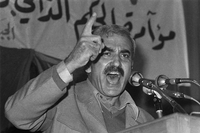
al Lydd, Palestine | Unknown - Unknown
George Habash was born in Lydda, Palestine. His father, Nicholas Habash, was a renowned businessman; his mother was Tuhfa. He had six siblings and married his cousin, Hilda Habash, who supported him throughout his career. They had two daughters, Maysa and Lama. His family was a Christian Orthodox family. The 1948 Nakba was a pivotal event in Habash's life. He interrupted his medical studies to aid the wounded in Lydda but was expelled along with his family when Zionist forces took over. Returning to Beirut, he graduated in 1951 and briefly worked in medical research. However, his focus remained on the Palestinian cause, leading to frequent arrests for organizing student demonstrations. In 1952, he opened a free medical clinic with Dr. Wadi Haddad in Amman, aiding refugees and people experiencing poverty while mobilizing youth against colonialist powers. The 1967 defeat and loss of Palestinian territories further radicalized Habash, prompting him to form the Popular Front for the Liberation of Palestine (PFLP) in 1967, adopting Marxist-Leninist principles and armed struggle. In Lebanon, Habash faced personal and organizational challenges, including a severe heart attack and the assassination of close comrades. Habash opposed the 1993 Oslo Accords, believing they compromised Palestinian rights. He resigned as PFLP Secretary General in 2000 but remained active in nationalist causes, founding the Al-Ghad Center for Strategic Studies. He published several works, including an autobiography based on extensive interviews. George Habash died of a heart attack in Amman on January 26, 2008. Supporters and opponents of the Palestinian movement recognized him as a dedicated and incorruptible leader.